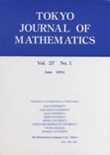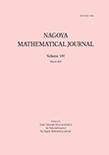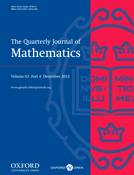
Rad Hrvatske Akademije Znanosti i Umjetnosti-Matematicke Znanosti
Scope & Guideline
Illuminating the Path of Mathematical Discovery
Introduction
Aims and Scopes
- Algebra and Representation Theory:
Research in this area includes studies on algebraic structures, representation theory of groups, and their applications, especially in understanding symmetry and mathematical models. - Number Theory and Diophantine Equations:
Papers often explore properties of integers, rational numbers, and relationships between them, including various types of Diophantine equations and their solutions. - Geometry and Topology:
This scope encompasses geometric properties and spatial relationships, including studies on manifolds, curves, and higher-dimensional spaces. - Functional Analysis and Inequalities:
This area involves the study of function spaces, operators, and the development of new inequalities which have significant implications in various mathematical contexts. - Cryptography and Information Security:
Research focusing on cryptographic techniques, encryption schemes, and their mathematical foundations has gained particular attention, emphasizing the importance of security in digital communications. - Mathematical Modeling and Applications:
The journal also emphasizes the use of mathematical frameworks to model real-world phenomena, including applications in physics, biology, and finance.
Trending and Emerging
- Advanced Algebraic Structures:
There is a growing interest in the study of sophisticated algebraic frameworks, including exceptional groups and their representations, reflecting a trend towards more abstract algebraic concepts. - Applications of Mathematical Theory to Cryptography:
The integration of advanced mathematical theories into cryptographic practices is on the rise, highlighting the importance of secure communication in the digital age. - Higher-Dimensional Geometry and Topology:
Recent papers indicate a trend towards exploring higher-dimensional geometric constructs and topological properties, which are becoming increasingly relevant in various mathematical applications. - Interdisciplinary Mathematical Modeling:
The use of mathematical modeling to address complex problems in fields such as biology and finance is emerging, showcasing the utility of mathematics in real-world scenarios. - Inequalities and Functional Analysis Innovations:
There is a noticeable increase in research focused on new inequalities and their applications in functional analysis, which are crucial for advancing theoretical mathematics.
Declining or Waning
- Classical Geometry:
Papers focusing solely on classical geometry concepts have decreased, possibly due to the rise of more abstract and computational approaches to geometric problems. - Elementary Number Theory:
Research that deals with basic properties of numbers and elementary techniques has become less frequent, as the focus shifts towards more complex and computational aspects of number theory. - Traditional Cryptography Techniques:
The exploration of conventional cryptographic methods has waned, with a noticeable pivot towards advanced cryptographic systems and modern security challenges.
Similar Journals

Pure and Applied Mathematics Quarterly
Elevating Research in Pure and Applied MathematicsPure and Applied Mathematics Quarterly is a prestigious journal published by INT PRESS BOSTON, INC, focusing on the diverse and evolving field of mathematics. Since its inception in 2007, this journal has grown significantly, currently holding a Q1 ranking in the Mathematics (Miscellaneous) category for 2023, positioning it among the leading publications in the discipline. With a commitment to publishing high-quality research, Pure and Applied Mathematics Quarterly fosters innovation and dialogue within the mathematical community by providing a platform for theoretical advancements and practical applications. The journal remains accessible to researchers and professionals through its ISSN 1558-8599 and E-ISSN 1558-8602, although it does not currently offer open access. As a vital resource for mathematicians, educators, and students, this journal endeavors to expand the frontiers of mathematical knowledge and contribute to the academic dialogue surrounding this fundamental science.

Tokyo Journal of Mathematics
Fostering Innovation in Mathematical ScholarshipTokyo Journal of Mathematics is a prestigious journal dedicated to the dissemination of high-quality research in the field of mathematics. Founded in 1978, this journal serves as a platform for researchers to publish their findings, providing cutting-edge insights into various mathematical theories and applications. Published by the TOKYO JOURNAL MATHEMATICS EDITORIAL OFFICE ACAD CENTER, the journal is based in Japan and forms an integral part of the global mathematical community. Although listed in the Q4 quartile of Mathematics (Miscellaneous) category for 2023, its inclusion in Scopus rankings highlights its ongoing commitment to scholarly excellence. The journal does not currently offer Open Access options, thus providing readers with insightful access to critical advancements in mathematics. With an ISSN of 0387-3870 and a publication history spanning over four decades, the Tokyo Journal of Mathematics remains an essential resource for researchers, professionals, and students alike, fostering the advancement of mathematical knowledge and collaboration across borders.

JOURNAL OF THE EUROPEAN MATHEMATICAL SOCIETY
Connecting Theoretical Insights with Practical ApplicationsThe JOURNAL OF THE EUROPEAN MATHEMATICAL SOCIETY, published by the EUROPEAN MATHEMATICAL SOCIETY (EMS), stands as a premier platform in the field of mathematics, known for its rigorous editorial standards and impactful contributions to both applied and theoretical aspects of the discipline. With a commendable Q1 ranking in both Applied Mathematics and Miscellaneous Mathematics categories, alongside a Scopus rank of 32 out of 399 in General Mathematics, this journal has established itself as a crucial resource for researchers and professionals. Since achieving Open Access status in 2021, it has expanded its reach, making cutting-edge research more accessible to a global audience. With a publication horizon extending from 2002 to 2024 and a dedicated focus on high-quality mathematical scholarship, the journal continues to foster innovation and collaboration within the mathematical community.

NAGOYA MATHEMATICAL JOURNAL
Connecting Scholars to Cutting-Edge Mathematical InsightsNAGOA MATHEMATICAL JOURNAL, published by Cambridge University Press, is a prestigious journal that has been at the forefront of advancing mathematical scholarship since its inception in 1950. With an ISSN of 0027-7630 and an E-ISSN of 2152-6842, this journal has gained recognition for its high-quality research contributions in the field of mathematics, achieving a Q1 classification in Mathematics (miscellaneous) as of 2023. The journal’s impact is further reflected in its Scopus rank of #164 out of 399 in the General Mathematics category, positioning it within the 59th percentile of its peers. Scholars, researchers, and students can access a range of innovative mathematical studies that explore diverse topics, fostering a vibrant dialogue within the mathematical community. By catering to a global audience, the NAGOYA MATHEMATICAL JOURNAL continues to play a critical role in shaping contemporary mathematical discourse and research.

JP Journal of Algebra Number Theory and Applications
Unveiling the Mysteries of Mathematics Through Peer ReviewJP Journal of Algebra Number Theory and Applications is a distinguished publication within the field of mathematics, specifically focusing on algebra and number theory. Published by PUSHPA PUBLISHING HOUSE, this journal serves as a platform for researchers and professionals to disseminate their cutting-edge findings and innovative methodologies. With its ISSN 0972-5555, it caters to an audience eager to explore mathematical concepts and applications that impact various scientific domains. Although it operates on a subscription model, the journal's commitment to high-quality peer-reviewed content makes it a valuable resource for students and scholars alike. The journal offers an exclusive insight into the complex interplay between algebra and number theory, ensuring that it remains at the forefront of mathematical discourse despite its coverage discontinuation from Scopus. The absence of an H-Index and low rankings within Scopus underscore the challenges the journal faces in a competitive academic landscape; however, it continues to foster a community for the exchange of ideas and the advancement of knowledge in mathematics.

PUBLICATIONES MATHEMATICAE DEBRECEN
Fostering Innovation in Mathematical SciencesPublicationes Mathematicae Debrecen is a renowned international journal published by the University of Debrecen, Institute of Mathematics, situated in Hungary. This journal, with both ISSN 0033-3883 and E-ISSN 2064-2849, has established itself in the field of mathematics since its inception, with coverage extending from 1997 to 2024. Recognized for its rigorous academic standards, it currently holds a Q3 ranking in the mathematics (miscellaneous) category for 2023 and ranks at the 42nd percentile among general mathematics journals in Scopus. Publicationes Mathematicae Debrecen aims to disseminate high-quality research across various areas of mathematics, contributing to the advancement of knowledge and practice in this dynamic field. Although it is not an open-access journal, its readers can access a wealth of scholarly work that addresses both theoretical and applied mathematical issues, making it an invaluable resource for researchers, professionals, and students alike.

QUARTERLY JOURNAL OF MATHEMATICS
Connecting Scholars through Rigorous ResearchQuarterly Journal of Mathematics, published by Oxford University Press, stands as a pivotal resource for the mathematical community, focusing on a broad spectrum of topics in the field of mathematics. With its esteemed history dating back to 1930, this journal continues to foster innovative research and discussions, providing a platform for scholars to share their findings and insights. Although the journal currently holds a Q3 classification in mathematics (miscellaneous) and is ranked #207 among general mathematics publications in the Scopus database, its commitment to quality and rigorous peer review ensures that it remains relevant and insightful. Researchers, professionals, and students alike will find the Quarterly Journal of Mathematics an invaluable tool for advancing knowledge and understanding in various mathematical disciplines, making it an essential addition to any academic library.

RENDICONTI DEL SEMINARIO MATEMATICO DELLA UNIVERSITA DI PADOVA
Elevating mathematical discourse through open access scholarship.RENDICONTI DEL SEMINARIO MATEMATICO DELLA UNIVERSITA DI PADOVA, published by the European Mathematical Society, stands as a notable open-access journal with a rich history in disseminating research across various domains of mathematics. With an ISSN of 0041-8994 and E-ISSN 2240-2926, this journal has embraced open access since 2023, significantly enhancing its visibility and accessibility to a global audience. Situated in Germany, its publishing house is based at Technical University Berlin, which emphasizes its academic roots and dedication to fostering mathematical research. The journal features a quartile ranking of Q3 across multiple categories including Algebra and Number Theory, Analysis, Geometry and Topology, and Mathematical Physics as of 2023, indicating a vibrant contribution to the field, despite its challenge in specific rankings. Researchers, professionals, and students alike will find in this journal a platform for innovative ideas and significant findings that are crucial to the evolution of modern mathematics.

TRANSACTIONS OF THE AMERICAN MATHEMATICAL SOCIETY
Pioneering Research in Applied and Theoretical MathematicsTRANSACTIONS OF THE AMERICAN MATHEMATICAL SOCIETY, published by the American Mathematical Society, is a premier journal in the field of mathematics that has been contributing to the advancement of mathematical knowledge since 1900. With an ISSN of 0002-9947 and an E-ISSN of 1088-6850, this journal holds a prestigious position in the academic landscape, evidenced by its Q1 rankings in both Applied Mathematics and Miscellaneous Mathematics categories as of 2023. With a Scopus ranking of #97 in General Mathematics and a percentile standing of 75th, the journal is recognized for its rigorous peer-review process and the quality of the research it publishes. Though it does not currently offer open access options, it essentially serves as a vital resource for researchers, professionals, and students seeking critical insights and developments in mathematical theory and applications. The Transactions aim to publish high-quality research articles that foster the exchange and dissemination of ideas, supporting the growth of both theoretical and applied mathematics within the global scholarly community.

Bulletin of the Iranian Mathematical Society
Fostering innovation in mathematics through scholarly exchange.The Bulletin of the Iranian Mathematical Society, published by SPRINGER SINGAPORE PTE LTD, is a distinguished journal dedicated to advancing the field of mathematics. With an ISSN of 1017-060X and E-ISSN 1735-8515, this journal has established a valuable platform for researchers and scholars to disseminate their findings from 2008 to 2024. The journal is categorized in the Q2 tier of Mathematics (miscellaneous) for 2023, showcasing its importance and relevance in the mathematical community, ranked #169 out of 399 in General Mathematics with a 57th percentile standing in Scopus. While currently operating under a subscription model, it remains an essential resource for professionals and students seeking cutting-edge research and developments in various domains of mathematics. The Bulletin aims to bridge theoretical research and practical application, thereby enriching both academia and industry.